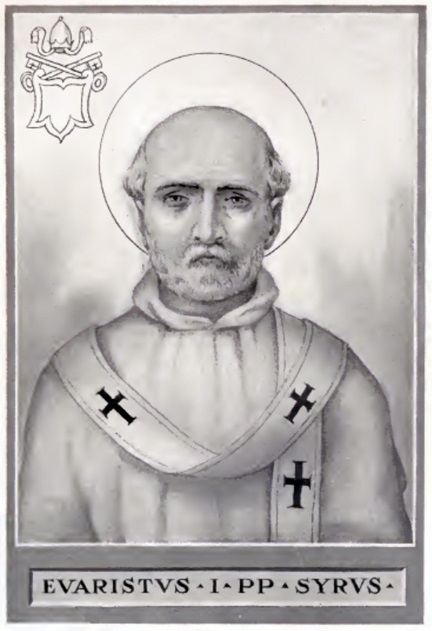October 26, 2017: ST. EVARISTUS
October 26, 2017: COMMEMORATION OF ST. EVARISTUS, POPE AND MARTYR
Thou art the first Pontiff to whom the Church was entrusted, after the departure of all those who had seen the Lord.
Prayer (Collect).
Have regard, O Almighty God, to our weakness, and as we sink under the weight of our own doings, let the glorious intercession of blessed Evaristus thy Martyr and Bishop, be a protection to us. Through our Lord Jesus Christ, thy Son, who liveth and reigneth with thee, in the unity of the Holy Ghost, God, world without end. Amen.
[Let us read the Church’s account on St. Evaristus]
Evaristus was born in Greece, of a Jewish father, and was sovereign Pontiff during the reign of Trajan. He divided the titles of the churches of Rome among the priests, and ordained that seven deacons should attend the bishop when preaching. He also decreed that, according to the tradition of the apostles, matrimony should be celebrated publicly and blessed by a priest. He governed the Church nine years and three months. He held ordinations four times in the month of December, and ordained seventeen priests, two deacons, and fifteen bishops. He was crowned with martyrdom, and buried near the tomb of the prince of the apostles on the seventh of the Kalends of November.
Life of St. Evaristus.
St. Evaristus succeeded St. Anacletus in the see of Rome, in the reign of Trajan, governed the church nine years, and died in 112. He is honoured with the title of martyr in the Pontificals and in most Martyrologies. The institution of cardinal priests is by some ascribed to him, because he first divided Rome into several titles or parishes, according to the Pontifical, assigning a priest to each: he also appointed seven deacons to attend the bishop. He conferred holy orders thrice in the month of December, when that ceremony was most usually performed, for which Amalarius assigns moral and mystical reasons; Mabillon and Claude de Vert give this, that at Lent and Whitsuntide the bishops were more taken up, but were more at liberty in Advent to give due attention to this important function: for holy orders were always conferred in seasons appointed for fasting and prayer. St. Evaristus was buried near St. Peter's tomb, on the Vatican.
The disciples of the apostles, by assiduous meditation on heavenly things, were so swallowed up in the life to come, that they seemed no longer inhabitants of this world but of heaven, where their thoughts and affections were placed, and whither they directed all their actions, even their necessary attention to temporal concerns. If the generality of Christians now-a-days esteem and set their hearts so much on earthly goods, and so easily lose sight of eternity in the course of their actions, they are no longer animated by the spirit of the primitive saints, and are become children of this world, slaves to its vanities, and to their own irregular passions. If we do not correct this disorder of our hearts, and conform our interior to the spirit of Christ, we cannot be entitled to his promises.
Taken from: The Liturgical Year - Time after Pentecost, Vol. V, Edition 1910;
The Lives of the Fathers, Martyrs, and Other Principal Saints, Vol. II; and
The
Divine Office for the use of the Laity, Volume II, 1806.
St. Evaristus, pray for us.
